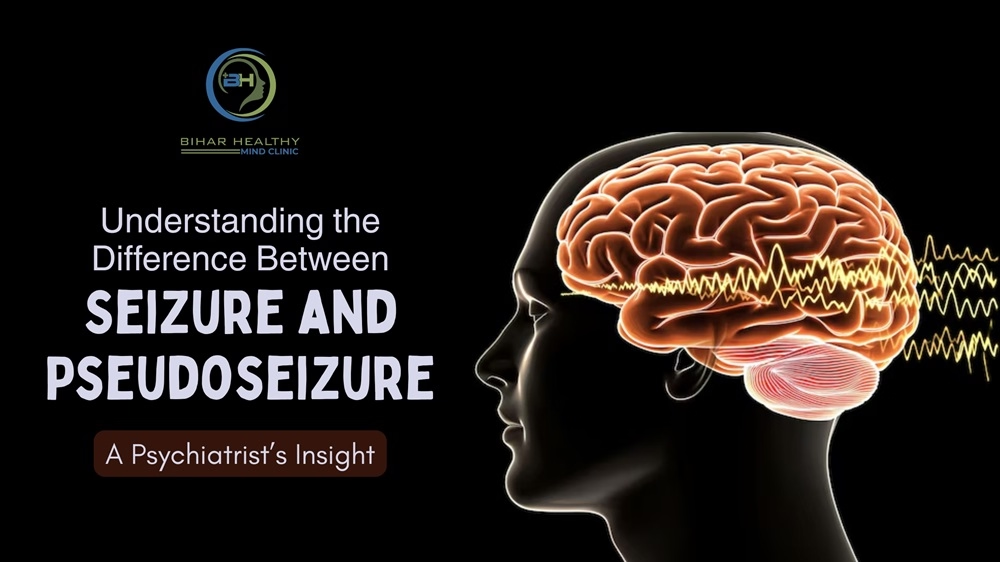
At first glance, seizures and pseudoseizures might appear similar, both involve sudden, uncontrolled bodily movements and can be distressing to witness. However, there are fundamental differences between the two. Under the leadership of Dr. Saurabh Kumar, MD (Psychiatry), the expert team at Patna Psychiatry offers precise diagnosis and personalized psychiatric care to effectively identify and treat these conditions. In this blog, we explore the difference between seizure and pseudoseizure, discuss diagnostic codes like Pseudoseizure ICD-10, and guide you on the next steps to recovery.
What is a Seizure?
A seizure occurs due to a sudden disruption in the brain’s electrical activity, often leading to alterations in movement, behavior, sensations, and awareness. Seizures are often associated with epilepsy but can also result from head injuries, brain infections, stroke, or metabolic imbalances.
Symptoms of Seizures:
- Loss of consciousness or awareness
- Muscle stiffening or jerking
- Uncontrolled movements
- Confusion or staring spells
- Post-episode fatigue or confusion
What is a Pseudoseizure?
Pseudoseizures, also known as psychogenic non-epileptic seizures (PNES), resemble epileptic seizures but are psychological in origin. These occurrences do not result from abnormal electrical activity within the brain. Instead, they are often linked to stress, trauma, or underlying psychiatric conditions like anxiety, depression, or dissociative disorders.
-
Symptoms of Pseudoseizures:
- Involuntary shaking or collapsing
- Lack of post-seizure confusion
- Awareness during the episode in many cases
- No abnormal brain activity in EEG tests
- Emotional triggers or psychological background
Pseudoseizure ICD-10 Classification
In medical coding, Pseudoseizure ICD-10 is generally classified under:
- F44.5 - Conversion disorder with seizures or convulsions
This classification highlights the psychological basis of the condition, setting it apart from true epileptic seizures. Correct diagnosis is crucial as misdiagnosing pseudoseizures as epilepsy can lead to unnecessary medication and delayed psychiatric care.
Key Differences Between Seizure and Pseudoseizure
Understanding this table helps patients and caregivers recognize the clinical and psychiatric distinction between the two.
Diagnosis: Why Accurate Evaluation Matters
-
At Patna Psychiatry, our approach involves a comprehensive evaluation process including:
- Neurological Examination: To rule out organic causes.
- EEG (Electroencephalogram): To detect abnormal brain activity.
- Psychiatric Assessment: To identify emotional trauma, stress, or underlying disorders.
- Video EEG Monitoring: This gold standard test helps differentiate epileptic seizures from pseudoseizures.
A correct diagnosis ensures patients receive appropriate treatment, avoiding unnecessary long-term use of anti-epileptic drugs in pseudoseizure cases.
Causes and Risk Factors for Pseudoseizures
-
Pseudoseizures are frequently associated with:
- Past emotional or physical trauma
- Post-traumatic stress disorder (PTSD)
- Depression or anxiety disorders
- Family or relationship issues
- Dissociative disorders
Addressing the core psychological issues is crucial for long-term recovery.
Additional Contributing Factors to Pseudoseizures
In many patients, pseudoseizures are the result of deep-seated psychological stress or unresolved emotional trauma. However, there are several other contributing factors that may increase vulnerability to these episodes:
- History of Childhood Abuse: Emotional, physical, or sexual abuse during early years can significantly elevate the risk.
- Personality Disorders: Particularly borderline personality disorder and dissociative identity disorder may co-occur with PNES.
- Family Dysfunction or Conflict: Ongoing familial tension or lack of emotional support can trigger episodes.
- Substance Use or Withdrawal: Alcohol or drug misuse, as well as withdrawal, can complicate both diagnosis and symptom expression.
- Learned Behavior or Secondary Gain: In some cases, symptoms may be unintentionally reinforced if they result in attention, care, or avoidance of stressful tasks.
These underlying psychological and social factors require careful, trauma-informed psychiatric evaluation to ensure the treatment plan addresses not just symptoms, but root causes.
Treatment Approaches
-
Seizure Treatment:
- Anti-epileptic medication
- Neurosurgical intervention (in select cases)
- Lifestyle changes (e.g., avoiding triggers, sleep hygiene)
-
Pseudoseizure Treatment:
- Cognitive Behavioral Therapy (CBT)
- Trauma-focused therapy
- Medication for underlying conditions like anxiety or depression
- Family Counseling to support the patient’s mental well-being
Why Choose Patna Psychiatry?
With a proven record of excellence in neuropsychiatric care, Patna Psychiatry is a leading center for treating seizure and pseudoseizure cases in Bihar. Under the expert care of Dr. Saurabh Kumar, MD (Psychiatry), regarded by many as the best psychiatrist in Patna, patients benefit from an accurate diagnosis, compassionate support, and evidence-based treatment plans.
When to Seek Help?
If you or your loved one is experiencing episodes resembling seizures, don’t self-diagnose. Seek immediate professional evaluation. Misdiagnosis can delay treatment and reduce quality of life.
Conclusion
Recognizing the difference between seizure and pseudoseizure is a crucial first step in ensuring effective treatment and recovery. While seizures stem from neurological disturbances, pseudoseizures have deep psychological roots. With accurate diagnosis and specialized care, patients can lead healthy, seizure-free lives.
At Patna Psychiatry, we’re here to help. Set up an appointment today and start your path toward improved mental and neurological wellness.
Disclaimer: All characters and events depicted in this blog are entirely fictional. Any resemblance to actual persons, living or dead, is purely coincidental. The content is intended for informational purposes only and should not be considered as medical advice. Always consult a qualified healthcare professional for medical concerns.
Visitors: 169





No comments yet.